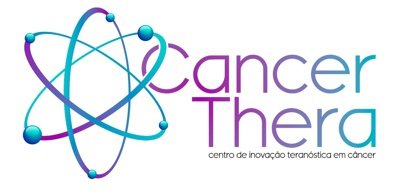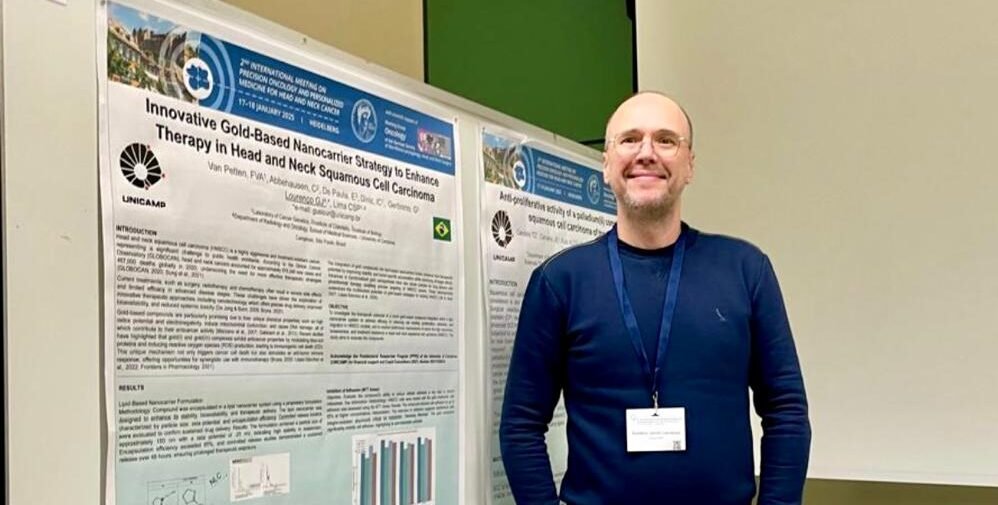Biologist and researcher at the Cancer Genetics Laboratory (LAGECA) of the School of Medical Sciences at the University of Campinas (FCM/Unicamp), Dr. Gustavo Jacob Lourenço participated in the 2nd International Meeting on Precision Oncology and Personalized Medicine for Head and Neck Cancer, presenting the results of studies conducted with his team under the coordination of Dr. Carmen Silvia de Passos Lima, oncologist and hematologist, professor at FCM/Unicamp, and principal investigator of CEPID CancerThera. The event took place on January 17–18 in Heidelberg, Germany.
Gustavo J. Lourenço, also an associate researcher at CancerThera, emphasized the importance of the event for knowledge exchange and strengthening international partnerships: “In addition to sharing our research, this experience allowed interaction with researchers from various countries, expanding our connections and collaborations.”
Palladium complex research highlighted
The LAGECA team had a significant presence, presenting seven studies on various topics. Among them, the study titled Anti-proliferative activity of a palladium(ii) complex over squamous cell carcinoma of the tongue — co-authored by Tuany Zambroti Candido, João Ernesto de Carvalho, Ana Lucia Tasca Gois Ruiz, Pedro Paulo Corbi, and Carmen Silvia Passos Lima — stood out by demonstrating the potential of the palladium complex as an antiproliferative agent for squamous cell carcinoma of the tongue.

According to the study, the palladium complex showed potential as an antiproliferative agent for tongue squamous cell carcinoma. However, as Lourenço explains, toxicity was also observed in non-tumor cells and no action was seen in another tumor lineage, suggesting that the complex’s selectivity may vary between different cancer cell types. Thus, there is still a long validation process before it can be considered for clinical use in treating tongue cancer.
This process includes additional in vitro assays to validate selectivity and toxicity in cells, as well as in vivo studies in animal models to investigate antitumor efficacy and systemic and pharmacokinetic toxicities (absorption, distribution, metabolism, and excretion). Moreover, exploring the cellular mechanisms of action is essential, checking whether the palladium complex induces apoptosis (cell death), causes DNA damage, or interferes with specific tumor metabolic pathways. “If preclinical results are promising, early clinical trials could assess the compound’s safety and dosage in humans,” Gustavo J. Lourenço explains.
A multidisciplinary and prolific team

In addition to the highlighted study, the other six works presented at the event demonstrate the continuous efforts of the LAGECA team and its collaborators to deepen the understanding of the genetic and molecular bases of tumors. These studies, ranging from identifying genetic abnormalities to functional analysis of molecules involved in tumor progression, are expected to contribute significantly to the development of more effective and personalized therapeutic strategies.
Check out the list of the seven studies presented and the respective authors. You can read the abstracts in the abstract book available here.
1) Innovative gold-based nanocarrier strategy to enhance therapy in head and neck squamous cell carcinoma | Fernanda van Petten Azevedo1, Camila Abbehausen2, Erich de Paula3, Isabela Carvalho Diniz1, Gabriela Gerônimo3, Gustavo Jacob Lourenço1, Carmen Silvia Passos Lima1.
2) Anti-proliferative activity of a palladium(II) complex over squamous cell carcinoma of tongue | Tuany Zambroti Candido1, João Ernesto de Carvalho4, Ana Lucia Tasca Gois Ruiz4, Pedro Paulo Corbi2, Gustavo Jacob Lourenço1, Carmen Silvia Passos Lima1.
3) miR-4421 as a possible modulator of MAPK/Akt pathway through ERP29 in pharyngeal cancer | Juliana Carron1, Carmen Silvia Passos Lima1, Gustavo Jacob Lourenço1.
4) Effect of ERP29 silencing on PI3K/AKT pathway gene expression in cisplatin-sensitive and resistant pharyngeal cancer cells | Juliana Carron1, Carmen Silvia Passos Lima1, Gustavo Jacob Lourenço1.
5) Impact of combined SNVs on renal function in HNSCC patients undergoing cisplatin-based treatment | E. F. D. Costa1, A. M. C. Ferreira1, Marilda Mazzali1, Celso Dario Ramos1, Gustavo Jacob Lourenço1, Carmen Silvia Passos Lima1.
6) Platin-based chemoradiotherapy as definitive treatment in advanced squamous cell carcinoma of head and neck | H. S. V. Sousa1, Vivian Naomi Horita1, Matheus Yung Perin1, D. N. A. Teixeira1, Joyce Gruenwaldt1, Eduardo Baldon Pereira1, Carlos Takahiro Chone1, Gustavo Jacob Lourenço1, Lígia Traldi Macedo1, Carmen Silvia Passos Lima1.
7) Docetaxel and cisplatin induction chemotherapy with or without fluorouracil in locoregionally advanced head and neck squamous cell carcinoma: A real-world data study | Matheus Yung Perin1, Vivian Naomi Horita1, D. N. A. Teixeira1, Joyce Gruenwaldt1, Eduardo Baldon Pereira1, Carlos Takahiro Chone1, Gustavo Jacob Lourenço1, Lígia Traldi Macedo1, Carmen Silvia Passos Lima1.
1 – School of Medical Sciences of Unicamp (FCM/Unicamp)
2 – Institute of Chemistry of Unicamp (IQ/Unicamp)
3 – Institute of Biology of Unicamp (IB/Unicamp)
4 – School of Pharmaceutical Sciences of Unicamp (FCF/Unicamp)
Text: Romulo Santana Osthues | Photo: Personal collection





